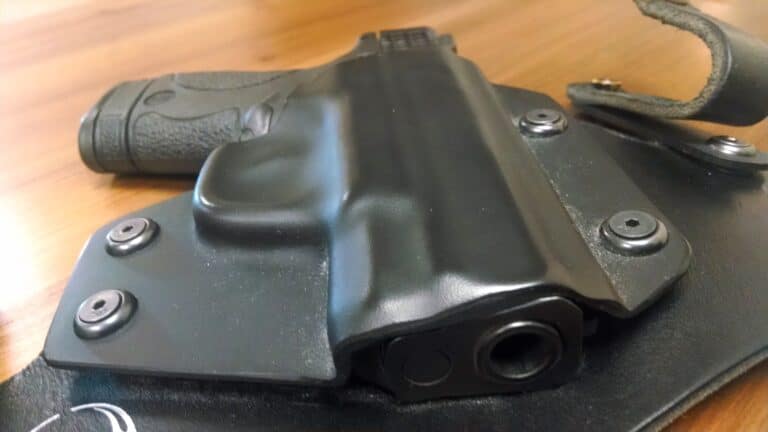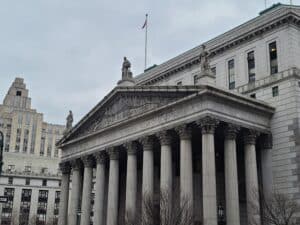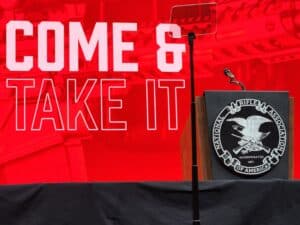A federal judge has found the bulk of the gun-carry law New York instituted in response to the Supreme Court striking down its previous law also violates the Second Amendment.
On Monday, Judge Glenn Suddaby of the Northern District of New York issued a preliminary injunction blocking enforcement of the law’s most controversial provisions. He also refused to issue a stay on his decision to enjoin what he described as a “patently unconstitutional” law, which means the state will not be able to enforce the impacted rules unless and until a higher court intervenes.
“[A]lthough the Court in no way suggests that America lacks a historical tradition of firearm-licensing schemes, it finds (based on the current briefing of the parties) that America lacks a historical tradition of firearm-licensing schemes conferring open-ended discretion on licensing officers,” Judge Suddaby wrote.
The ruling found the state could not force gun-carry permit applicants to turn over information on their family members or their social media accounts. It stops the state from subjectively denying applicants based on whether officials believe they have a “good moral character.” And it prevents them from banning anyone, including those with permits, from carrying a gun at restaurants that serve alcohol, theaters, protests, places of worship, banquet halls or conference centers, parks, areas at airports or clinics before security checkpoints, and public buses. Suddaby also ruled the state’s attempt to prohibit gun carry on all private property unless explicitly allowed by the owner, including private businesses open to the public, by default was unconstitutional.
The decision brings New York’s gun-carry restrictions closer in line with the rest of the country. It also represents the latest setback for New York’s new gun law and Governor Kathy Hochul (D.), who backed it as a rebuke to the Supreme Court’s decision in New York State Rifle and Pistol Association (NYSRPA) v. Bruen. A second federal judge has already blocked the law’s church-carry prohibition in the Western District, and a group of armed Jewish worshipers is challenging it in the Southern District. The law’s constitutionality took center stage in the recent debate between Hochul and challenger Lee Zeldin (R.) as polls show a much tighter-than-expected contest.
Gun Owners of America, one of the plaintiffs in the case, celebrated the decision as a rebuke of Hochul and the law.
“Just like we warned politicians after the Bruen decision, fall in line, or we will force you to,” Erich Pratt, the group’s senior vice president, said in a statement. “We are excited to see Kathy Hochul finally served a plate of humble pie, and we are fully prepared to continue the fight should she again attempt to disarm the citizens of her state at a time when her party’s policies are only escalating the danger that everyday citizens face.”
The news from the decision wasn’t all bad for Hochul, though. Judge Suddaby removed her as a defendant in the case and allowed the subway ban to remain in effect because he found plaintiffs didn’t have standing to sue her or the train ban. He also allowed the state’s strict training requirements to remain in place despite expressing concern about the potential cost of complying with it.
A spokesperson for the office of Attorney General Letitia James (D.), which is representing the state in the case, said “we are reviewing and considering our options.” The state previously appealed the judge’s decision to issue a temporary restraining order against the law that shared many of the same conclusions in his preliminary injunction.
Judge Suddaby’s lengthy ruling, clocking in at 184 pages, examines the historical evidence offered for each of New York’s regulations at length. Suddaby even describes how he performed his own research for potential historical matches for some of the provisions when the state failed to offer them. For instance, the judge said the state offered no comparison for its social media reporting requirement, and what his research found did not help their case.
“Rather, the Court has mostly found only instances in which this demand was (properly) made of convicted sex offenders while registering for a Sex Offender Registry,” he wrote. “Suffice it to say, the need to regulate convicted sex offenders has not been shown to be analogous to the need to regulate applicants for a concealed-carry license.”
Suddaby is also often unsubtle in his critique of the attempts to identify historical analogues the state did make.
“For the sake of brevity, the Court will not expound on why it finds that barring some people from openly carrying rifles on other people’s farms and lands in 19th century America is hardly analogous to barring all license holders from carrying concealed handguns in virtually every commercial building now,” he wrote. “Even if the way the historical and modern regulations burdened one’s Second Amendment right were the same, the State Defendants’ attempt to analogize these six laws to Section 5 of the CCIA would stumble over the second of the Supreme Court’s two ‘central’ metrics: ‘why the regulations burden a law-abiding citizen’s right to armed self defense.'”
He further argued the state’s attempt to ban is a “thinly disguised version of the sort of impermissible ‘sensitive location’ regulation that the Supreme Court considered and rejected in NYSRPA.” He said the state’s provision banning licensed individuals from carrying at any public protest was doubly unconstitutional, creating a “paradox” implicating both the First and Second Amendments.
“[T]he Court finds itself in a paradox created by a regulation that prevents a license holder from possessing a handgun while gathering with individuals to collectively express their right to protest the regulation by possessing handguns,” he wrote. “Levity aside, the Court does not understand how barring Plaintiff Terrille from carrying concealed at a gun show at a Polish Community Center would further this regulation’s purpose of avoiding the ‘destr[uction] [of] the exercise of [someone else’s] constitutionally-protected rights.’ The Court could be wrong but it will hazard a guess that the Center probably does not lease space to opposing expressive groups at the same time.”
Ultimately, Suddaby ruled many of the provisions in New York’s law are “unreasonably disproportionate to the burdensomeness of [their] historical analogues” and is filed with “unprecedented constitutional violations.”
UPDATE 11-7-2022 7:39 PM EASTERN: This piece has been updated with comment from the New York Attorney General’s office.






